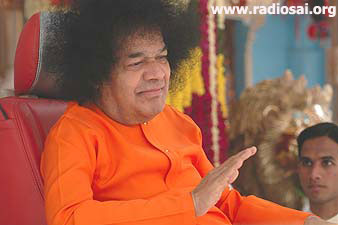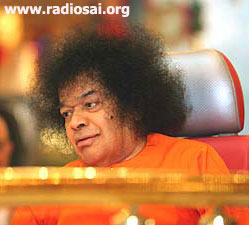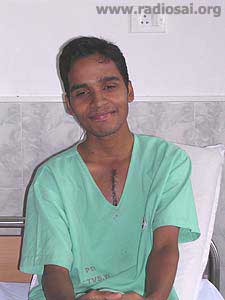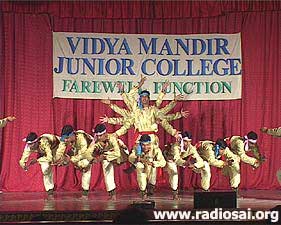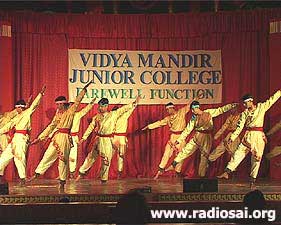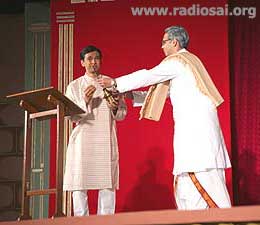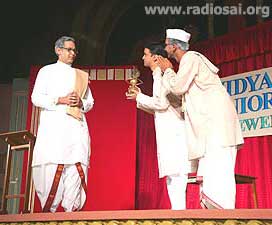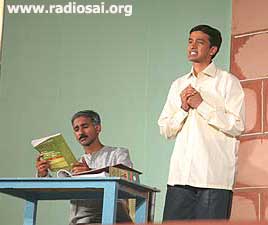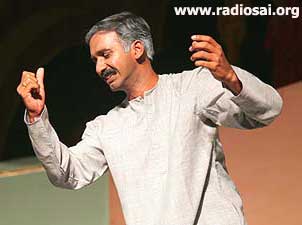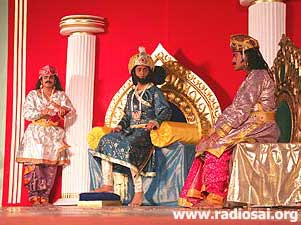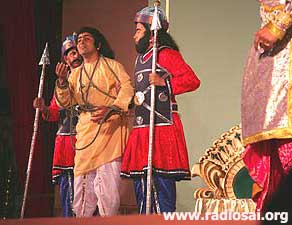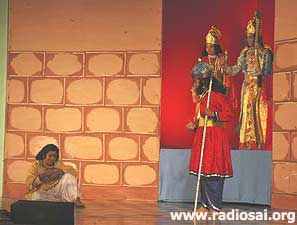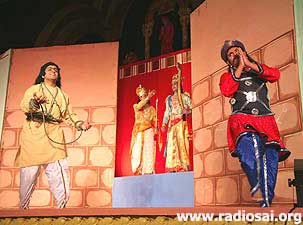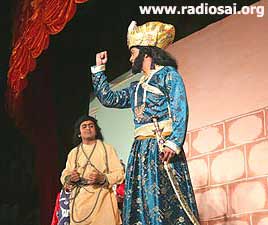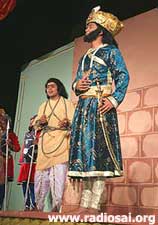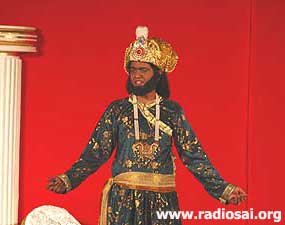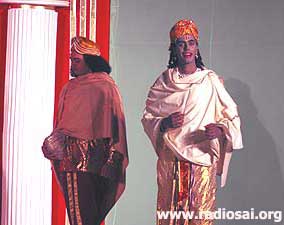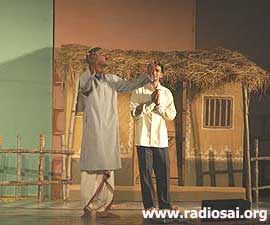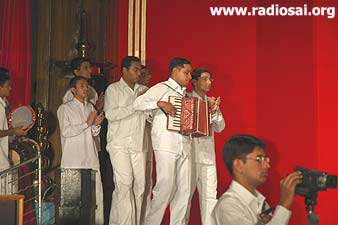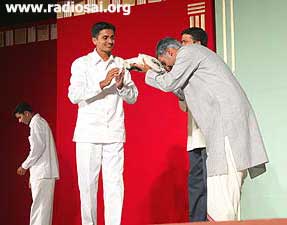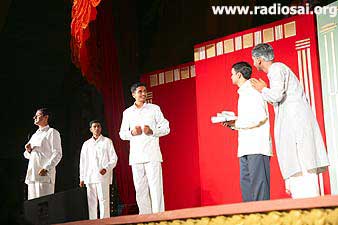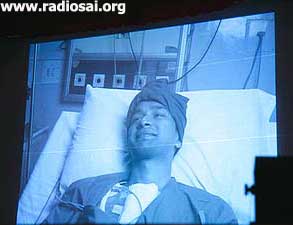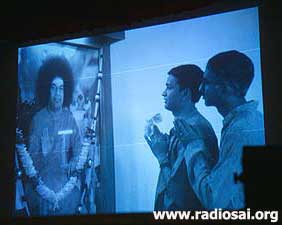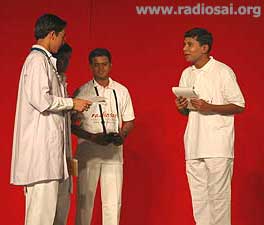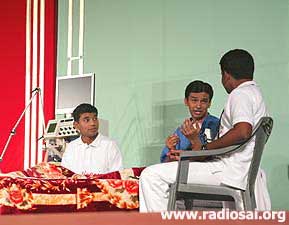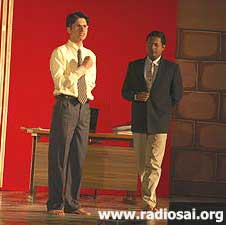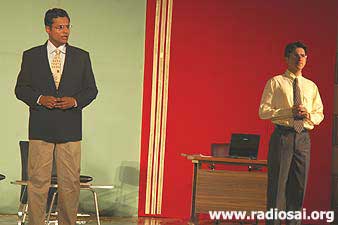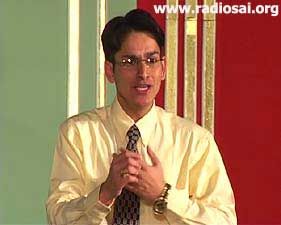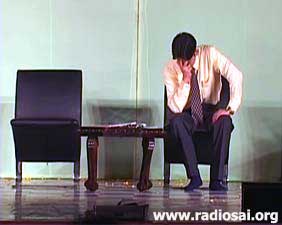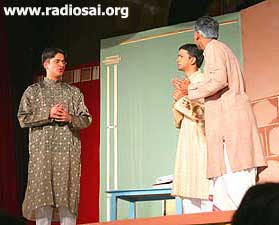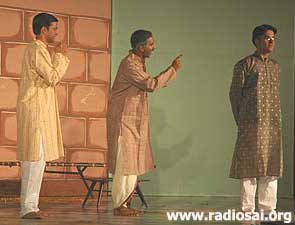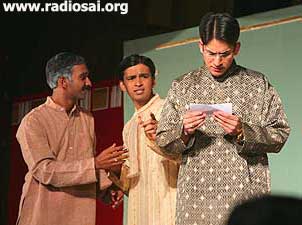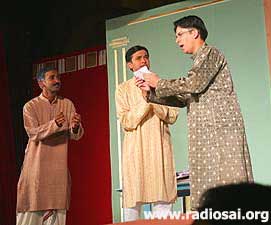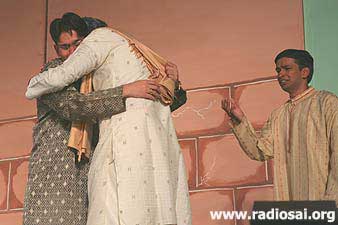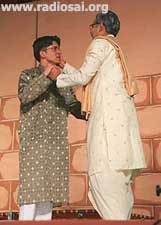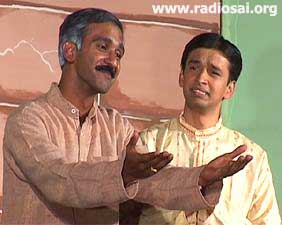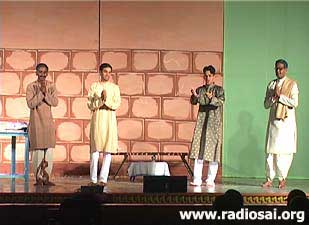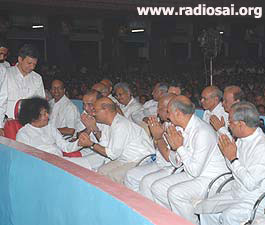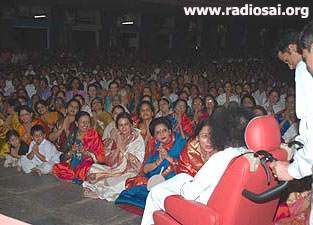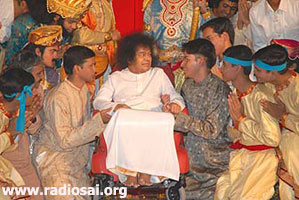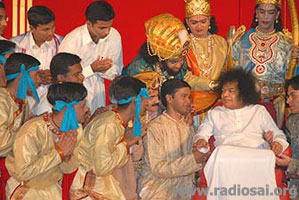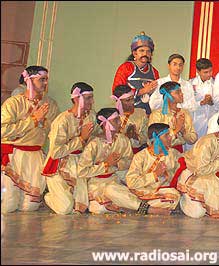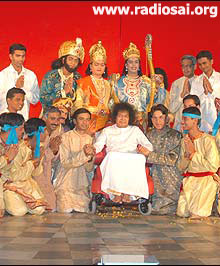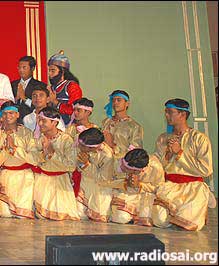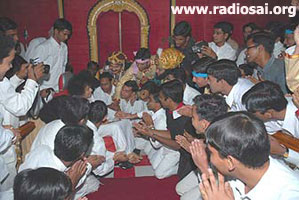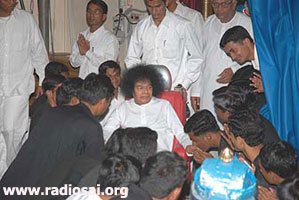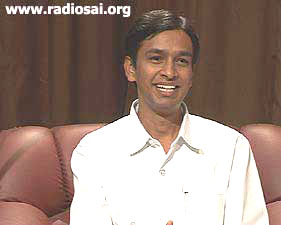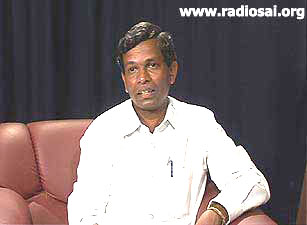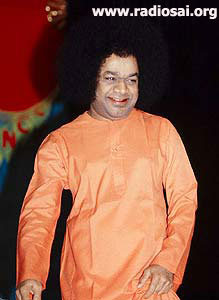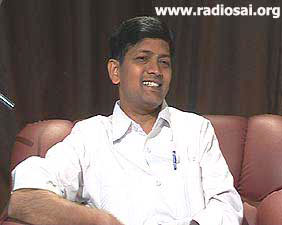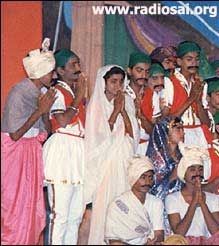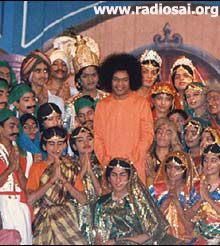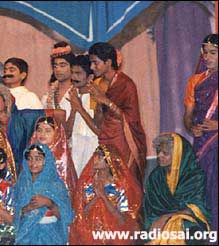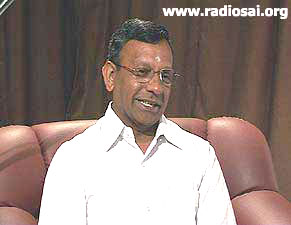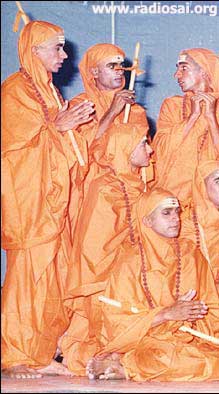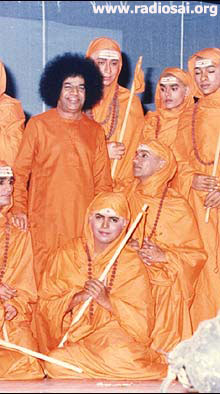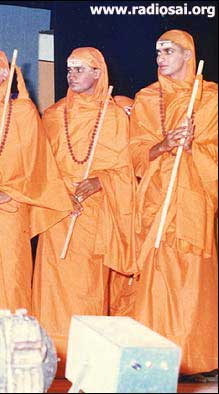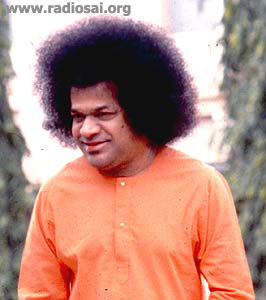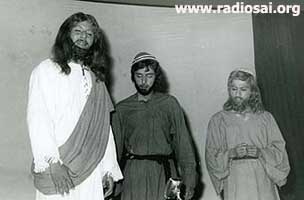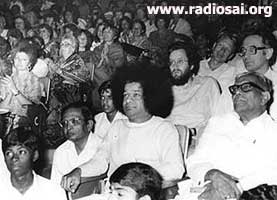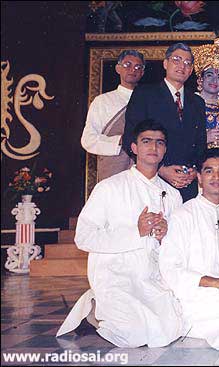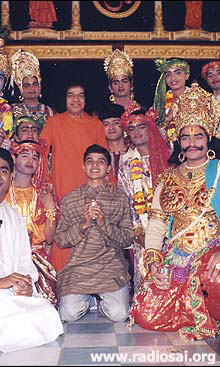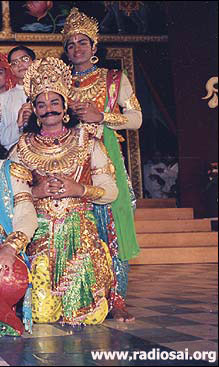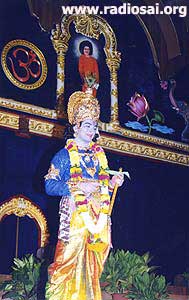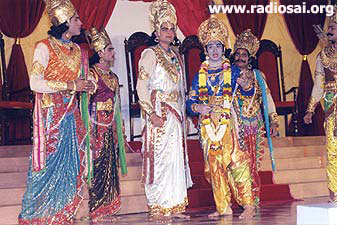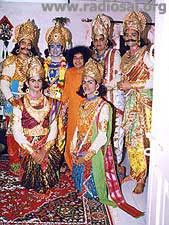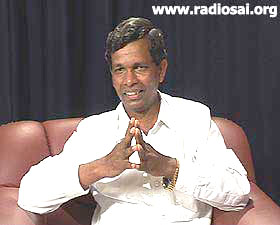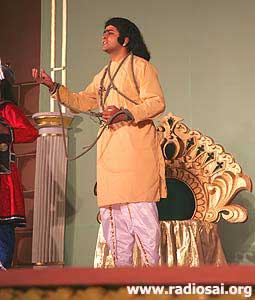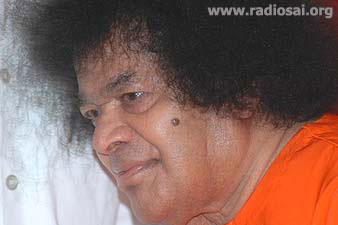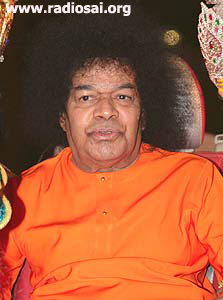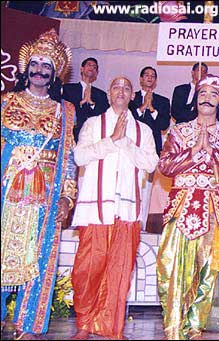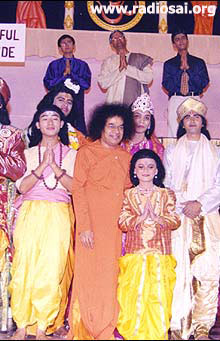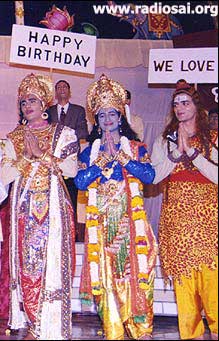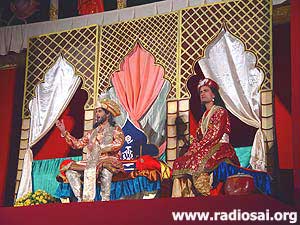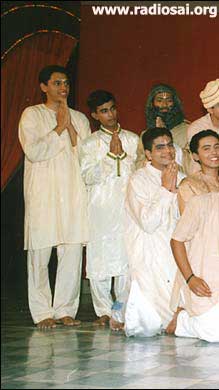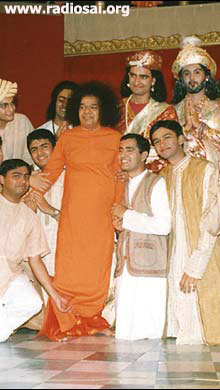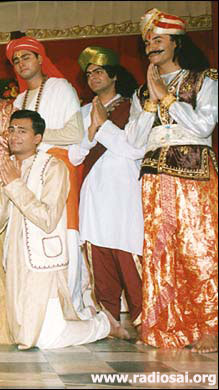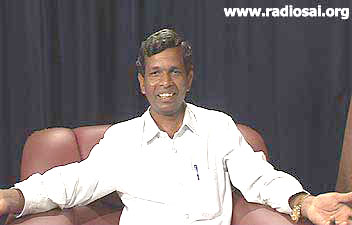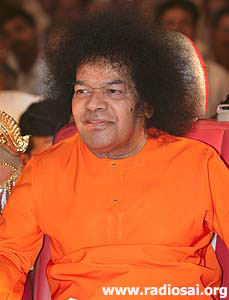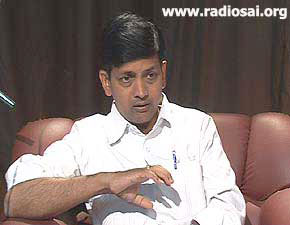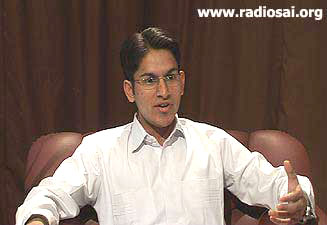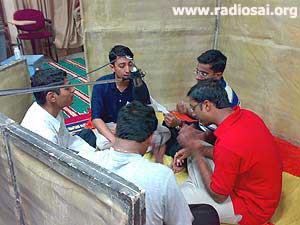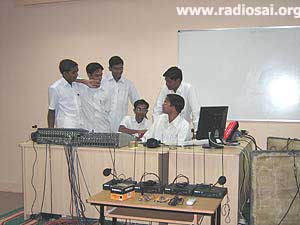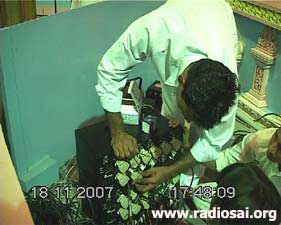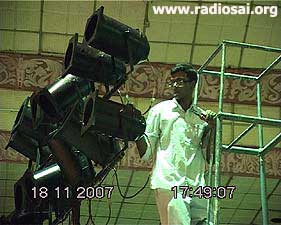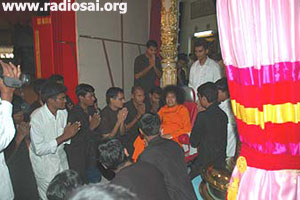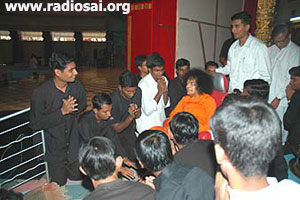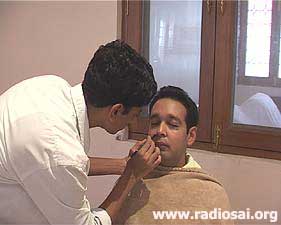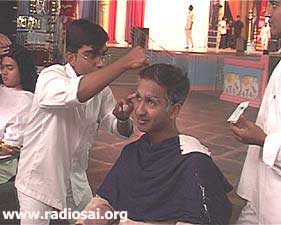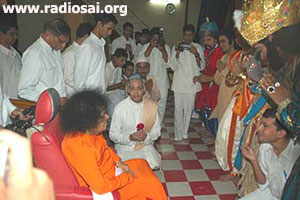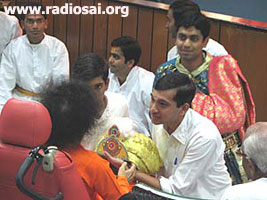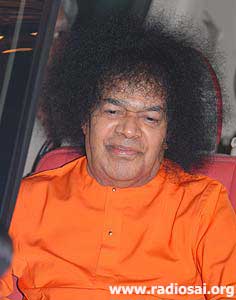 |
 |
 |
Volume
6 - Issue 02
FEBRUARY - 2008 |
|
His Boys – His Voice “Hrudayavaani” and Heartening Glimpses There were no eyes that were not wet that momentous evening. It was as if someone had glanced deep into each one of their hearts and touched those delicate sentiments that are encased in the innermost core of their being, and as a result they had all become so vulnerable. Their overwhelmed, teary eyes conveyed all that their hearts wanted to say. For the thousands who had gathered in Prasanthi Nilayam to bask in the bliss of His Presence on the occasion of His 82nd Birthday, it was a soulful treat, that the Merciful Lord had granted, which will linger in the deep recesses of their being for a long time to come. Evoking the Exceptional “I have been coming here for the last 37 years and have seen so many performances by His students, but this one was exceptional. I must say, to me it was a spectacular new direction. I have never seen this before…But the glorious moments of that evening was when I became so emotionally involved with the drama that I cried…I was fortunate to be sitting in the same row as Swami, and at this moment, with tears in my eyes, I turned to look at Him and what I saw overwhelmed me more…His eyes too were moist and overflowing….He was, in fact, much more involved in it than I...,” says Mr. Isaac Tigret, internationally acclaimed business magnate and millionaire-turned-philanthropist and an ardent devotee of Sai.
Mr. Kishan Singhal, a well-known entrepreneur based in Canada, who was also present that evening, said, “The story of the drama was so profound and real that I could not contain myself. It was a ‘slice of life’ script and I could relate to it completely. And the boys depicted the scenes so beautifully – with so much finesse, passion and perfection. The impact it had on me is so deep that whenever I think of it, I am drowned in emotion…” “This Drama cannot be described in words,” said Father Charles Ogada from Nigeria. “It was as if the gates of Heaven opened and what I saw were like gods and demi-gods acting on the stage. It was not just a mere drama, but a rain of Divine Energy. In fact, that evening, the Ashram was overflowing with people and I was tired too; I was in two minds if I should go for the programme. But Swami within me said, ‘Go’. Then, I replied, ‘Swami, I will go, but please ensure I get a good corner from where I can watch the programme clearly.’ And to my surprise, in spite of the huge Birthday crowd, I got a vantage point. And as the drama progressed, it created a surge of energy within me and filled my whole body with ripples of emotion. Whenever the father of the main actor spoke, floods of tears would well up within me and it was hard to hold them back. All I can say is that this Convocation drama had the power to penetrate that deepest core of our being where we are one with Love. Simply put – it was ‘InSaightful and Heartful’ completely.”
No surprise then that the Divine Lord who, according to the main actor of the drama, Divij, “was truly, the Scriptwriter, Director, Producer, Financier and everything!” had named the Drama “Hrudayavaani” meaning, “Voice of the Heart.” For Bhagavan, His boys are His Voice, and how He used them as His chosen instruments on this occasion to convey certain salient messages to the large concourse of devotees assembled for His Birthday, is a story which is as revealing as it is fascinating. How the Convocation Drama 2007 was Born
“The conceptualisation of the drama started about October 22, just after the Dasara celebrations,” recalls Mr. Amey Deshpande, a research scholar who was one of the main coordinators of the Drama. “However, we were still unsure whether there would be a drama this year, as the previous year there was no drama because of the inauguration of the Sri Sathya Sai International Indoor Stadium. But on October 26, we were overjoyed; we had received the final ‘go ahead’ from Swami. For many aspiring actors, who had not gone home for the winter vacation, it was the answer to their sincere prayers. But the Lord now was keen to know the story and we were at the drawing board straight away. The Convocation dramas in the recent past have been on a social theme relevant to the current times, unlike a mythological or abstract subject, but at the same time laced with inspiring anecdotes from great epics and history. “While this was the most significant guiding factor in developing the story, there were many other aspects, by no means less important, which had to be taken cognizance of carefully. For instance, Swami does not approve the depiction of any negative traits. In a previous year’s drama, during the rehearsal, when He saw the boy who was playing the role of an ambitious musician, shout at his friend for not making use of his talent to garner glory and prosperity, and then storming out of the scene in a huff, Swami was visibly unhappy. He said, ‘My boys do not get angry. Unless you have that evil trait in you, it cannot come out. You should be more mellowed down.’” ‘My Boys Should Not Even Get Such Ideas’ - Baba
Dr. Shailesh Srivastava, one of the principal teacher coordinators of the drama, shares another revealing episode. “I remember we had a small skit enacted in front of Him in Kodai Kanal a few years ago. There was a scene where the students working as factory workers go on strike. Then and there, Swami stopped the performance, and asked, ‘What are you doing?’ ‘Swami, it is a strike,’ the boys gently muttered. Perturbed, He asked, “Why strike?’ The Lord was completely into the drama. ‘Swami, it is a drama, and in the plot there is a strike,’ the boys cautiously tried to clarify. ‘Drama? No, even in a drama, you should not do a strike.’ Smart that we always think we are, the boys again tried to convince Him that it was a factory scene and the story needed the workers to go on strike. But what Swami said next was very significant. With lots of concern in His Voice, He said, ‘See, in my opinion, our students should not even get such ideas…’ It is at these times that He gives us glimpses of what He really wants us to become. 'If you get such an idea, it means there is some element of that inside you. And when you enact a character or a scene like that, a little bit of that can get into you. Very few people can avoid feelings and tendencies seeping into them,' He says. That is how much Swami is sensitive to what we do and how we portray it. And apart from this, there are many other critical criteria that also had to be adhered to. As Amey explains, “The drama should have an interesting twist which brings cheer and hope to the viewers; songs and music that can touch their soul as it is a more powerful medium than the dialogues; of late, a dance gelling into the story adding colour and liveliness; and more importantly, powerful characters that convey the cream of Bhagavan’s message, candidly and emphatically. There are of course many other aspects too, which are equally crucial, though the details of which are not always obvious, like the sets, costumes, recording, etc. So, it is in this background canvas that we had to sketch a tale of inspiration and transformation that would be worthy of Swami’s sacred Name and Vision. “By His Grace, we developed two stories so that He could choose one and Swami liked the first one. And this storyline selected by Bhagavan was actually the juxtaposition of two touching tales – one from real life and the other from a famous fable. The ‘real life’ one was, in fact, the story of Pradeep from this inspiring magazine Heart2Heart.” The Story Chosen by the Lord To refresh readers’ memories, the story of Pradeep, the son of a poor farmer in Orissa who had the dream of becoming a doctor, was published in the Healing Touch section in the November 2005 issue. To recount in brief, Pradeep, though born into a large family of illiterates in a rural town of Orissa , wanted to study, and successfully cleared the 12th grade. His father had spent all his meager earnings on his studies, even though he wanted him to join him in the fields. Later, when Pradeep persisted with his desire to pursue medicine, after much reluctance, his father gave in. But the most tragic event in their life happened when the health screening done before admission into the medical college revealed that Pradeep had a serious heart ailment, and hence could not be given a seat, unless he was operated upon and his condition corrected.
The family was completely crestfallen and Pradeep’s dreams instantly turned into dust. Now, saving his life was the most critical priority for the family; but the father was helpless as the astronomical amount needed for the surgery was way beyond his means. It is at this time that they heard of Bhagavan’s Hospital in Whitefield, and soon, without spending a single rupee, Pradeep was completely cured. The very next month, H2H had this story in the ‘Healing Touch’ section. And interestingly, reading this account, a doctor from Australia was so moved that he decided to sponsor the entire medical education of Pradeep. During his next visit to India, this kind Sai devotee enquired about the address of this young student in the Radio Sai office and went to Orissa to meet Pradeep and do the needful. The protagonist of the Convocation Drama 2007 was, in fact, a reflection of Pradeep. “Apart from this true story,” Amey continues, “the other popular legend on which the Drama was based, is the story of the ambitious son of a rabbi, who vehemently argues with his father against taking up the family profession and in a fit of anger leaves home. Years later, having lost everything, he repents and returns home, only to find out that his father is no more. Devastated, he longs to somehow communicate to his father that he is a completely changed man. "The people in the village ask him to go over to a mountain top where a stone with many holes exists. It was believed that any prayer written there would be conveyed to God. The son writes a letter seeking forgiveness, and pleads with God to let his father know that he is indeed transformed. Even as he shoves his letter into one of the crevices, another letter falls. When he picks that letter up, to his utter amazement, it is his father’s letter to God praying Him to forgive his son and look after his well being. The son is overwhelmed with his father’s unconditional love. “We weaved this famous tale with the true hospital story of Pradeep to construct a storyline that was simple but stirring, infused with the Sai philosophy of education, healthcare and service.” A Tale to Touch Everyone Almost everyone in the audience could relate to some character or the other of the Drama and that is one of the principal reasons why it had such a tremendous impact. In fact, one of the main actors, Mr. Ranjan Sharma, recalls, “After the practice session one evening, the day when Bhagavan had come to see the rehearsal, as I was sitting in the jeep to return to Mandir, one person appeared there and kept saying, ‘Sir, this is my story… Please listen to me, this is actually my history.’ Unfortunately I could not get to talk to him.” The story of Convocation Drama 2007 was that real… ‘Hrudayavaani’ – The Voice of the Heart When the curtains rose to a thunderous applause on the evening of November 22, “Hrudayavaani” stole everyone’s hearts with a scintillating dance, and on the top of the screen was a big banner: “ Vidya Mandir Junior College – Farewell Function”.
And then came onto the stage Mr. Vishwanath Verma, the principal of the college, who congratulates the students for their splendid performance and with passionate zeal, inspires them to be courageous, industrious and dream big. Finally, he presents the best student award to Mr. Sudhir for his outstanding record, academically and otherwise. Sudhir is thrilled. He humbly accepts the award and says, “I have read elevating stories of gurus of yore, but today I have seen one. Sir, you are my role model.” And then he shares his dream. “Sir, I want to be become a doctor and see the smile on the face of a cured patient...” The principal is touched and wishes him well. Then enters an old man, and Sudhir introduces him as his father, Mr. Purushottam, to Mr. Verma who is glad to see Sudhir’s parent and begins to talk highly about his son, his dreams and capabilities; but Mr. Purushottam is unimpressed, rather he seems worried. To download the script of Scene 1, Click here.
A Poor Man’s Dream Shatters As the next scene opens, Sudhir is excited about fulfilling his dream and shares his vision of ‘Dr. Sudhir’ with his father. But he is shocked to hear his father’s response. “Give up your dreams of becoming a doctor…! Chasing dreams is a privilege of the rich, not for the son of a postman.” Sudhir is confused, crestfallen and cries. His father then reveals, “Today, I stand begging at the doors of destiny for your life…you have a hole in the heart.” He goes on to say how he had toiled all his life to save Sudhir but had always kept this fact a secret. Now, the only thing he wants, he says, is: “Money, rupees four lakhs to be precise – an amount that can buy your life.” Sudhir soon recovers from the shock seeing the plight of his father and then begins to console him. He tries to infuse courage into him. “Father, all we need is not money, but faith,” he says, and continues, “and that is what we have.” And then he goes on to narrate the story of the saint, Sri Bhadrachala Ramdas. To download the script of Scene 2, Click here.
Faith in God Instills Courage The third scene is a flashback which opens to the royal chamber of King Tanesha. Into his majesty’s presence is brought the arrested ‘culprit’ - Ramdas. “I have received reports that you have misappropriated tax money to construct a temple. What do you have to say on that?” the King thunders, while his ministers taunt the pious saint. “All I know is, I have provided shelter to the One who provides shelter to all…if taxes can be used to build forts, citadels and tombs, why not for building a temple for the Eternal Emperor?” Ramdas explains. Tanesha is now only more enraged and orders that the pious tax collector be put to severe torture until he craves for forgiveness. The pure saint begins to plead with his Lord Rama to come to his rescue and bursts into a soulful song.
In the next scene, he is in the prison being tortured and offered stale chapattis to eat by the jailers. But before he puts the rotten food in his mouth, the background screen parts and to a thunderous applause, there is seen Lord Rama and Lakshmana blessing His dear devotee, unknown to him. As soon as Ramadas puts the food in his mouth, overcome by its sweetness, he spontaneously sings to the Lord in praise: “Dear Lord, there is nothing sweeter in this world than your Divine Name.” The jailers are enraptured by his melodious voice and sublime feelings; they begin to literally dance to his tune!
The Lord Rescues Those Who Seek His Refuge And immediately after this, Tanesha turns up at the jail and asks Ramdas for the final time to accept his mistake and seek pardon, or pay up the entire amount spent. The saint humbly submits that he has no money to settle any account with the King, and immediately cries out to his Lord Rama, “O Rama, it is You who must settle account with the King, as I have spent everything for You…” The Emperor is disgusted and leaves in a huff.
He goes to his inner room, and as he takes to his bed to relax his disturbed mind, exasperatedly he mutters, “Ya Allah…” And in no time, enter into his private room, two handsome individuals dressed in simple attire. The King is shocked. The two introduce themselves as Ramanna and Lakshmanna, servants of the Lord’s servant whom he has imprisoned. Tanesha laughs out loud and says, “That wretched criminal had to be punished.” Lakshmanna is immediately enraged, but Ramanna calms him down, and then offers a bag of gold coins to the King, and says, “I have come to pay the entire amount with interest. Count your money, O King.” The Muslim ruler wonders how Ramdas could manage such a huge amount. “I owe him much more than this..,” Ramanna says as He looks at His brother, and then tells the king: “Now that your account is settled, please release Ramdas.” To download the entire script of Scene 3, Click here.
When the curtain rises for the next scene, it is Sudhir back with his father. “Father, the Lord Himself rescued Ramdas. When intentions are pure, I am sure He will take care...” Sudhir tries to pep his father’s spirits up. Purushottam is moved, watching the sterling virtues of his son and bitterly moans, “Oh Lord, why do You want to take away such a precious child from me?...You promised to take care…wherever we are...however we are….I beseech You to come to my rescue.” And just then is heard the strains of a bhajan from afar, which soon is more audible. “Rama Anaraada…” which means, ‘Call out ‘Rama’ just once and it will eradicate every problem...” A group of people dressed in white, pass Sudhir’s house singing bhajans enthusiastically.
And the next minute, two youth dressed in white come to their house, extend greetings, and then reveal that they have brought Prasadam for them from Bhagavan Sri Sathya Sai Baba. They inform them: “We are students of Baba’s University…. He has told us to go and serve in the villages…today we have brought some of the best doctors for a preliminary check up.” Purushottam is immediately interested, but at the same time is apprehensive about the cost. The youth then tell them that Baba has set up magnificent ‘Temples of Healing’ where they do not have to pay even a single paisa. Purushottam is overwhelmed with gratitude to the Lord for this sudden shower of Grace. Overcome with His Compassion, he says, “Oh Rama! There you came to the rescue of Your great devotee Ramadas, and today you are alleviating the suffering of a simple postman!” To download the script of Scene 4, Click here.
Stepping into the Temple of Healing In the next scene, the stage is empty but on the big white screen behind, a video starts. It depicts Sudhir and his father walking on the rudimentary village road, then taking a bus and alighting in front of the Super Specialty Hospital. Sudhir is overwhelmed looking at the imposing structure. He is then welcomed into the dome of the Hospital by the sevadals. And now he is filled with awe. The serenity of the ambience touches him deeply. Later, he is seen by a doctor, undergoes tests, is admitted into the ward for surgery and then wheeled into the operation theatre. While his father, worriedly waits outside the complex, he sees a picture of Swami on the wall and pours his heart out in tears. Meanwhile, the operation is over and Sudhir is now in the CCU. The care and concern of the nurses move him. He is absolutely relaxed; a gentle smile plays on his lips. His dear father feeds him with his own hands, while the doctors come to enquire about his condition. And finally, Sudhir, who is almost perfect, is transferred to the normal ward for a few more days of rest. He is a picture of genuine joy and satisfaction.
When the lights return, Sudhir is in the Cardiac ward and enter two gentlemen with Radio Sai T-shirts on. They seek the doctor’s permission to interview the patient, and then going over to Sudhir’s bedside, they introduce themselves as members of the Radio Sai Team. Then they cordially begin a chat with Sudhir, eager to know more about his story. Sudhir is in fact more eager than them to share his dreamlike experience and goes on to narrate all that has happened till then. To download the drama script of Scene 5, Click here.
Homesick Cranes Return to their Nest When the next scene opens, it is a completely different setting - an office in the USA. Two non-resident Indian or NRI doctors are in conversation and one of them seems to be in an introspective mood. When the other prods him to say something, he says, “You know Guna, the past few weeks I have been doing some soul searching, and every time I find myself groping around in darkness.” Dr. Guna, then, shares his experience of how he felt so good the other day when he spoke to his parents, and then says, “Today I feel, even as I am pursuing my dreams, age is catching up with my parents. They need me now….” Next, he reveals, “Ashutosh, I am going back home for good…tomorrow.” Dr. Ashutosh is shocked, he says, “Guna, is this a joke?” But Guna is serious and Ashutosh is baffled. He tells him that it is the craziest thing to do when his career is peaking in the US . But Guna explains, “My parents gave me life and now can I just leave them to the mercy of destiny? No…Ashutosh, they are everything to me…And frankly, I am not sacrificing anything.” And the next moment, he leaves wishing him good luck.
Ashutosh is now in a total mental turmoil. Memories of his parents flash in his mind…he takes his phone and tries to call them, but the number is not reachable. Slumped in the sofa, he introspects and then suddenly breaks down… “When my father told me that he misses me, I told him not to get sentimental….O father, I never understood your love… and mother, you just tearfully watched me leave...never said a word as you did not want to hurt me…I miss you both so much...” Ashutosh is crying uncontrollably. A few minutes pass… and at the end of it, in a state of desperation, he switches on the Radio, swaps a few channels and suddenly hears the powerful voice of Swami: “Mother and Motherland are superior to even heaven…one must love their parents...be ever grateful to them….” These words hit him like a thunderbolt. He gets from up the chair, reinvigorated and strong. To download the script of Scene 6, Click here.
Radio Sai: The Medium is the Message When the curtains rise yet another time, Sudhir is in his home, joyous and singing gleefully, thanking the Lord. But, Purushottam laments, “I have failed as a father, Sudhir…” The son is taken aback, but the father continues, “When as a child you held my hand to take your first few steps, I had promised myself that I will not let you be like me, languishing in poverty. But alas…” Purushottam’s sadness is heavy and unrelenting, and Sudhir is helpless. He holds his father’s hands close and tight. Just then there is a knock on the door and enters Dr. Ashutosh. He asks the father and son if they are Purushottam and Sudhir respectively, and when they say, “Yes”, he reveals that he heard about them on Radio Sai. And then, revealing more, he adds, “I was deeply touched by Sudhir’s story. I want him to become a doctor…. If you permit, I will pay for the entire medical education of Sudhir”. The father-son duo is stunned. Purushottam blurts out, “Are you Baba come in human form! Or is this a figment of my imagination!” He is unable to believe it. He asks more probing questions, “Who are you? And where do you come from?”
Ashutosh then states that he is a doctor from USA, and goes on to narrate how when he heard his son’s story, he felt Sudhir was calling out to him…” Purushottam is at a loss for words to express his feelings; finally, he says, “You are an angel, son…Blessed are your parents to have a child like you. They must be so proud of you…” At this point, Ashutosh cuts him in disgust. “Please don’t say that. No parent would wish to have an ungrateful son like me… Little did I realize that the dreams I had been chasing were just mirages. And then one day the call came. That Voice, commanded me to wake up to my duty. I searched for my parents, but in vain. I enquired about their whereabouts in every nook and corner of Shripuram. I think I have lost them for ever.” The moment Purushottam hears the word “Shripuram”, he suddenly remembers something. He goes up to the shrine of his house, picks up a letter and gives it to Ashutosh saying, “This belongs to you…when Sudhir was in the hospital, I went for Darshan one day and that evening Baba Himself came up to me, and handing this letter, He said, ‘Aye Postman, Shripuram Doctor ko deliver karo” (Hey postman, give it to the Shripuram doctor). I searched hard to find the person who suited that description, but now I think I have found the right addressee...” When Ashutosh opens the letter, tears roll down his cheeks. “Oh my God!” he cries. “This is my father’s letter to Baba, praying for my wellbeing. Even though I deserted them, my parents had only blessings to give me. Oh God! What have I done? What a wretched, ungrateful son I have been!”
Coincidence, a Miracle Where God Chooses To Remain Anonymous At this point, into Sudhir’s home, enters Mr. Vishwanath Verma, the college principal. The moment Ashutosh sees him, he runs and hugs him tight, and cries, “Oh father! Please forgive me.” [Swami’s Eyes too are full watching this…His whole being is overwhelmed with emotion.] Mr. Verma comforts his son saying, “Past is past… I have realized that everything that happens in life is a stroke of an Unseen Hand that is sculpting our lives into an image of perfection. Let us bow down to Its Mastery.”
And then all the characters in the drama bow down in gratitude to their Beloved Lord, and while Purushottam says, “O Divine Director, how beautifully you have scripted our stories! How wonderfully you have pulled the strings and brought everyone together! Can we ever fathom Thy leelas?” Sudhir comes forward and conveys, “Hey Sutradhari (The invisible wire-puller)! You have held our hands and led us through every step of the way.” Finally, Ashutosh soulfully expresses, “O Hrudayavasi (resident of our hearts), all the hearts beat in unison with love, gratitude and devotion to Thee.” To download the entire script of the last scene, Click here.
And then, there is a final song during which all the actors enter the stage in coordinated groups while singing in jubilation about His Love and Kindness, and position themselves into a beautiful formation. The Loving Lord then eagerly wants to come onto the stage, and as He moves, one of the dignitaries sitting beside Him, gets up unasked and with tears in his eyes, says, “Swami! This drama is so very inspiring. It has touched my heart deeply.” Swami, who is also very emotional, lovingly holds his hands for sometime, and then carries on. Mr. Gokul Das, a businessman and an ardent devotee from Mumbai, gets up next and touched by the story and His moving Mission wants almost to hug Swami. As Swami is now about to go up the stage, Mr. Ramana Rao, a long standing dedicated devotee, falls at His Feet and says, “I have not seen a drama like this ever before…It was a superb and soulful performance.”
The Lord, immensely pleased with His properties’ performance, then comes amidst them on the stage and lovingly interacts with them. He grants them the prized opportunity of having their photographs with Him, blesses them profusely, and then as He enters backstage, all the boys too follow Him inside.
Behind the curtain, Swami expresses His deep satisfaction, “I am very, very, very, happy….all of you have done a great job.” And then allows them to touch His feet, lovingly pats their cheeks, and by the time He leaves, the cup of joy in every boy’s heart is overflowing with bliss. They are virtually swimming in ecstasy.
Yes, for all the participants, this is a moment that will eternally be green in their memory, energizing and inspiring them in their journey through life. But this is not even one tenth of the whole story. Just like for a teenager getting a college degree, all the time spent in the hostel with his mates - the adventures and experiments, exercises and excitements, experiences and enlightening moments - is more precious than the moment of getting the certificate; for the students privileged to be a part of the Convocation drama, all the hours of preparation and practice before the final performance are the sweetest. Because this is a drama whose Director is the One who decides the destinies of all, be it a bee, buffalo, or a human being. The Lord Looks to Our Feelings
Mr. Divij Desai, who acted as Sudhir in the drama, recalling a revealing episode when Bhagavan taught him how to perfect his performance, says, “There is one scene in the drama where Sudhir, after being cured of his ailment, gratefully sings to his Beloved Sai and prays, ‘Lord, I have this desire to become a doctor and serve You in Your very Hospital which has treated me free of cost. Dear Lord, You have given me a new birth, I owe You my entire life from now on…’ "So, it was a touching song and I remember whenever Swami used to discuss the drama, the first thing He would do is to ask me to sing this. I am not a singer and for the drama this was to be sung by Brother Ravi Kumar (who has a gifted mellifluous voice). But inside the interview room, Swami would ask me to sing, and I used to feel embarrassed, because I could never reach that pitch. So I used to say, “Swami, these two lines are very high pitched, I may not be able to…” But Swami used to stop me. “Forget all that, just sing!” And I used to just do it to the best of my ability. "Only later, I realized that Swami was, in fact, not concerned about my singing; He was actually looking for the emotion that the song expressed. He wanted me to imbibe and assimilate that feeling, and become one with that emotion. That was one instance where I felt that in every act of ours, whether it is drama or real life, Swami looks for the intention. He is interested only in the feelings of our heart, rather than the output.”
And this has been the experience of Dr. Shailesh Srivastava, who has been the music director for Convocation dramas for over fifteen years now. “For all of us,” he says, “when a song is sung, or dialogue is spoken in the drama, the accompanying music, sets, the ambience and everything else matters so much to get into the emotion of the scene; but, for Swami, the moment a dialogue is spoken, He is into it completely. Just as the word and its meaning are intricately bound; for God, the moment a word is spoken, it is already there with Him. He does not need any background music or add-ons to feel it. We cannot imagine a devotee who cries and says, ‘Oh Lord! Will You please come to my rescue?’ to which God says, “Where is that enriching background music? I am not able to get the feeling of your prayer!” For God, the sincere emotion behind the word itself is enough. And I have seen this on many occasions. There have been times when we have thought we need to put background music, but when He comes for practice sessions, He just wants to listen to the dialogues. The background music and other embellishments are only for the sake of the public; because, we human beings, require all kinds of add-ons to feel the scene. Recollections of Swami’s Dramatic Directions “I remember one significant rehearsal session many years ago. We were in the pit, in front of the stage, and playing background music. Swami was seated in the first row of the auditorium watching the play. We could not see Him as we were sitting in front of Him facing the stage. Suddenly, the drama stopped, and somebody tapped me from behind. I turned, and Swami said, ‘Soft… don’t play music so loudly’. I immediately rectified. And I have experienced this any number of times. For Swami, it is the feeling and the word which goes together, and that’s what is most important; the tune and other aspects are secondary. “In 1994, when we had the drama on Saint Surdas, in the month of October we had a few days of winter vacation, and Swami sent instructions for a few of us, from Brindavan, to stay in Prasanthi Nilayam and prepare the music for the drama. And immediately after He returned in the first week of November, He called us in and wanted to hear the compositions. One aspect of Swami which is striking is that He used to ask the singers to sing the same song again and again for many days, but every time He heard it, it was as if He was listening to it for the first time. It was the lyrics and their meaning which were of prime importance to Him. The tune, if it did not take away the glory of the lyrics, was satisfactory. “I remember at the time of the ‘Chal re man’ drama in 1998, He asked me the exact meaning of a few lines, which I did not know, and then immediately He said, 'Without knowing the meaning, what are you trying to compose? A song without meaning is like a tree without fruits – it’s of no use'. And later, whenever He asked me about the songs of a drama, He would say, ‘Have you written the songs? Can you show Me what you have written?’ It is never, ‘Have you tuned the songs?’ There were one or two occasions initially when I did not understand this, and so I took out the paper and started reading it. Then, He used to be surprised. ‘Why are you reading it, sing it…,’ He would say. Only then I understood that, for Swami the tune has to be there, but the words were most important. And He is the Inspirer of the words, tunes, everything – but He does it in His own way, through us, only if we let Him to. I can tell you how. ‘See! I just told him to make a Qawwali and he has done it!’ - Baba
“It was the time of summer vacation in 1990 and Swami was in Brindavan. I was all alone in my room in East Prasanthi , and one day I thought to myself: ‘Why don’t I try composing a Qawwali (a style of singing inspired by Sufi music), though, I had no prior experience. Maybe we will get an opportunity to sing it during the Summer Course to be held after the vacation ends. "This was my motivation. And that evening, as I started writing and fitting a tune, Mr. Sai Surendranath, who had just returned from Whitefield on some work, came to me and said, ‘Swami was discussing that there should be a music program for the Summer Course, and He told me to tell you that you should tune a Qawwali!’ It was a bolt from the blue. Before that Swami had never asked me to compose anything! “I was so surprised! It was like a stamp of Divine Authority put on my work, because I had just begun the composition, and frankly I never knew how to really go about it. But the moment the word came from Swami, I was extremely happy! I completed the job to my satisfaction and went to Brindavan. There, I had just taught the first part of the song in the Institute green room to two singers – Ravi Kumar and Kabir, and Swami arrived there with a dignitary! "He wanted to hear whatever was done, and after He heard that small part, He was extremely happy. It was one of the most satisfying moments of my life. He then looked at the VIP and said, ‘See! I just told him to make a Qawwali and he has done it! Shraddhaavaan labhatey gnanam (one who has faith will certainly gain wisdom)!’ So, though He is the Doer all the time, this is how He works through you and even rewards you!” Letting Him Take Over The experience of Dileep, one of the scriptwriters of the recent Convocation drama was something similar. “I had actually never penned down the dialogues for any scene in any drama before 2007. Whatever I had written earlier, was either scrapped or modified to such an extent that only nouns and pronouns remained …” confesses Dileep. “For this drama (2007), I was supposed to write the script for the Bhadrachala Ramdas episode. With fear and trepidation, I opened the laptop and started typing. At every word I prayed to Him to write through me, and at the end of four and half hours, the scene was ready. I just read it over again and visualized the acting. And, I was so overcome by emotion that tears started rolling out of my eyes. I was then doubly sure that it was He who wrote through me.” When Sai Himself was the Scriptwriter…
While the Lord was the invisible scriptwriter for the recent drama, there have been occasions in the past when He had literally written the whole script Himself! Dr. Shiv Shankar Sai, the warden of the Prasanthi Nilayam campus, recalls, “The beauty of the drama ‘Radha Bhakthi’ staged in 1985 was that Bhagavan Himself wrote the script! In fact, I vividly remember how Swami dictated the entire drama to me, in Telugu, inside the interview room, three hours at a stretch on each day! It went on for three days! "It was such a memorable occasion for me. And Bhagavan also told me that, earlier in His Childhood, He had written a very exhaustive drama on Radha’s life, called ‘Radha Bhakti’ which demonstrated in detail the devotion of Radha to Lord Krishna. But since the Convocation drama cannot be for more than an hour or so, He said, ‘We will have a part of that!’ He selected the parts, dictated the script, and also the lyrics for the songs. "He even taught the tunes to a student singer, Mr. S. Kumar, which He Himself had composed! It was a wonderful time! For almost one and a half months, Swami used to call us almost daily, and spend time in revising the dialogues and the songs, taking care of the costumes, acting, dialogue delivery and what not!”
That was Bhagavan’s level of involvement in the Convocation drama. And it all actually started much before 1985. As early as 1961, Swami had directed a drama on the great Maharashtrian saint, Sakkhubai, which was performed by the students of the Veda Pathasala, the educational institution that Swami had set up in those days to impart the learning and understanding of ancient Indian Vedic hymns. Golden Memories from Dr. Ravi Kumar After this, one notable occasion when Swami took immense interest in the boys’ drama was in 1974. Dr. Ravi Kumar, a faculty member now, who was then a student, goes down the memory lane and says, “Those days we were students of Sri Sathya Sai Arts and Commerce College, Brindavan, as the Sri Sathya Sai University was still in the womb of time. And we got lovely chances from Swami. One day He casually mentioned: ‘I will give you a lot of opportunities. We will put up a drama in Prashanti Nilayam’. At that time we used to have the College Day function during March every year. And for that year’s programme, Bhagavan chose the drama ‘Bhaja Govindam’. It was a beautiful drama. Swami selected all the actors for the various roles, and got totally involved in it! In fact, when Mrs. M.S. Subbalaksmi, the legendary vocalist, came for Darshan, He even asked her to sing the songs and had them recorded. He proudly told her: ‘My students are putting up Bhaja Govindam drama; it is for that.’
“I think it was more than 95 to 97 days that we practiced in Bhagavan’s Presence in Brindavan. In the Old Bungalow, where Swami used to reside then, there used to be an enclosure with huge mirrors! They were probably 20 by 20-25 feet, and were on three sides of the room. And Bhagavan would be sitting in the middle, directing our play. "You can imagine what a feast for the eye it was to see the infinite number of ‘Swamis’ sitting there, watching keenly every single gesture, every instance of inflection in the voice, every line of the song, and then correcting us, guiding us, and making us redo a part any number of times until it came up to His level of perfection! “A vivid memory for me is this enchanting scene: Swami had selected four of us to sing the Shiva Panchakshari Stotram, and early in the morning, when the Sun’s rays were just streaming into the room, Bhagavan would be sitting on a rocking chair and we were seated around Him singing the hymn Nagendra Haaraya…. "It was so beautiful! When we finished singing, He would insist that we chant the phala shruti too, which is usually sung at the end of the sacred song which says that anyone who recites this in the presence of Lord Shiva Himself, will get to the ‘Shiva Loka’ (abode of Lord Shiva) and attain the Lord. Swami would invariably tell us, ‘Hey! You forgot that! Repeat that!’ And it is only then we realized He was reminding us that we were, in fact, chanting in front of Lord Shiva Himself, and we didn’t know the boons that He was going to grant us!
“After this magnificent marathon practice session of nearly a hundred days, came the College Day and we performed this play. The then Revenue Minister of Karnataka was the chief guest, and at the end of it, when we went inside the Mandir, Swami was talking to the Minister. He was very happy and then suddenly He looked at us and said: ‘Yes! This is the need of the hour. Kaavi, khaadi and khaaki – all these three must be given due representation; they must be in their place for society to develop harmoniously.’
“Khaaki refers to the law and order in society – the police. Kaavi is the renunciant’s attire – orange robe, and Khaadi is the administrator – the politician who makes rules and governs. Swami then said: ‘When all these three are in their place, society will progress.’ I remember, the Revenue Minister who was so overwhelmed by then, said, ‘Swami, just the sight of so many people in this orange robe (the drama attire), is such an auspicious sign for the entire country!’ "Swami said, ‘Yes, you are right. It is very, very auspicious for the world, and these boys have made Me so happy! I will fill their lives with happiness!’ And then, interestingly, as a physical gesture, Swami filled bowls of fruit salad, gave it to us and made us eat it in His presence! While we were amazed at His Compassion, He again said, ‘I will fill your lives with happiness from now onwards.’ That is how precious the interactions of Swami are with the boys during the drama. Every single moment of proximity with Him is laced with such profundity. It could be a word, a smile, a gesture, an admonition, a comment or an acclamation – every act of His is pregnant with meaning. Narrating one more such instance from a drama which was enacted on November 22 , 1980 , Dr. Ravi Kumar says, “I had the opportunity to act in the play ‘The Kingdom of Heaven.’ This was a drama on the life of Jesus Christ, written and enacted by former students, who prayed to Swami to permit them, and the Kind Lord had agreed. Swami then looked through the entire list of actors, picked up one particular role, and said, ‘Ask Ravi to do this role.’ "At that time, I had finished my education in Swami’s College and was doing my post-graduation at Anantapur, about 80 kms from Puttaparthi. So they said, ‘Swami, Ravi is not here, he is studying there.’ Swami then said, ‘No, he comes on weekends, he can practice at that time.’ I, therefore, was given that role, and it was only much later did I realize how so beautifully Swami had indicated to me what was to come later in my life.
Premonition of Events to Come “The role was that of a blind beggar, who is cured by Jesus Christ. And during one of those days, when we were having practice sessions, as Jesus was curing me in the drama, Swami entered through the side, and remarked: ‘See! Sai Baba came and this fellow got his eyesight!’ And we all laughed. The next day, the same thing happened, and again Swami remarked: ‘See, Sai Baba came and he got his vision back!’
“The normal tendency after the rehearsal session was to rush to Swami, and He would make a few comments about the drama, ask us to repeat certain dialogues, tell us the correct emotion which should animate the scene, and so on. While this interaction was going on, Swami suddenly asked, ‘Did you hear the applause during Darshan?’ We had heard the clapping sitting inside the green room, so we said, ‘Yes Swami, we heard the applause.’ And then He looked at me and said, ‘You know, I gave vision to an 18 year old girl who was born blind!’ And, with His Eyes riveted on me, He immediately continued, ‘And, I will give you also!’ We all laughed because we thought Swami was making a joke, since I was a blind beggar in the drama. But we never realized that Swami was actually indicating to me what was to come in the future - that I would lose my eyesight, and He would give it back! It was five years later that I burnt my eyes completely while doing an experiment in the Chemistry lab and gained my vision back only by His Grace.” Every session with Swami before the actual performance, therefore, was a boon to the students. Because the Supreme Teacher would take that opportunity to instill attitudes and behaviours, knowledge and wisdom, faith and conviction into the hearts and minds of His wards, which could mould them into masterpieces of men. And to this end, He would invest any amount of time and exert Himself to any length. Singing to the Divine Lyrics After the ‘Radha Bhakthi’ drama in 1985, Swami again wrote the entire script for another play on Markandeya (a mythological character) in 1987. In the 1998 drama, there were many padyams (poems or hymns) to be sung by characters like Arjuna, Lord Krishna, Nakula, etc. (from the epic Mahabharata) and after listening to the tune of one padyam, Swami was so happy that He said to Dr. Shailesh, “I will Myself write and give you the padyams. You can then tune them for all the Pandavas (characters from Mahabharata)”. This was in Brindavan. Two days after Swami returned to Puttaparthi, when the boys were with Him in the interview room, Swami went inside and brought one old notebook in which were the padyams in His own Handwriting. Whenever Dr. Shailesh relives that episode, he is thrilled. “He tore two pages from that book and gave it to me. I still have those papers with me!”
“Again, in the same drama, there was a burrakatha (stories rendered in a folk-lore style in Telugu, often in the praise of God),” Dr. Shailesh continues. “But none of us knew how the singers were supposed to dance in the burrakatha folk song. And so, can you believe (!), Swami got up from the jhoola (swing) in the Trayee Hall (were we were all seated), slightly lifted His Robe, and then showed the dance movements! He taught the two singers the dance steps Himself.
"In a way, this was very interesting because we were all playing different instruments and the reverse was going on! Generally we dance to His tune but here was God dancing to our tune! He demonstrated for a whole minute and then said, ‘I used to dance in My childhood; I know everything’.” To that extent is His Love and sense of deep concern with the drama, as well as for the boys who are privileged to be part of it. He is always there to rescue them from every trouble and hurdle. In the same drama in 1999, when Swami observed that the student who was enacting as Lord Krishna had a few pimples on his forehead, He circled His Hand and then counted “…28, 29, 30”, and when He finally opened His Hand, there was a small transparent plastic cover containing 30 tablets to be taken for 30 days. Looking at the boy, Swami jokingly remarked, “Now, even if you want, you will not get these pimples anymore.” Again, when the same boy submitted to Swami on the morning of the day of their actual performance that he had developed a cold and sore throat, Bhagavan instantly waved His Hands and out came a tablet. Needless to say, ‘ Krishna ’ was completely cured and did a splendid job that evening. Instances like this are galore, for, during every occasion the Lord, who was the Director of the Drama, was also the Protector, Comforter and Caretaker of His Dearest boys. But there is one interesting anecdote that Mr. B. N. Narasimha Murthy, Warden of the Brindavan Campus, narrates which is outstanding: Using the Right Instrument to Write in Gold
“I remember it was the 2000 Convocation Drama. We had selected one particular episode from Mahabharata, wherein, the Pandavas are leading a life of exile in the forest, and undergoing a lot of hardships. And sometimes, because of the suffering, there is bickering among the five brothers. On one particular day, Dharmaraja, the eldest, is feeling really exasperated, and the rest of them are also down in their spirits. "At this time, Lord Krishna appears on the scene, and then Dharmaraja and the other Pandava brothers plead with Him and seek His Grace to help them go through the trial with courage. Lord Krishna, then, takes a palm leaf from a tree nearby, writes a message on it, rolls it neatly, gives it to Dharmaraja, and then says, ‘Open the leaf and see the message, only when you are in total despair, with nothing to hold on to.’ “Soon, Dharmaja is in such a terrible predicament and he opens the leaf. The message inscribed on it is simple: ‘This too shall pass.’ So this was the scene and Swami had called the students who were playing the roles of the Pandavas and Lord Krishna into the interview room. This was almost the third week of November, and we were getting ready with all the sets and other accessories required for the drama. "Suddenly, Swami asked Sudheendran, who was enacting as Krishna , “How are you going to write the message on the leaf?” "He had not thought about it either. So, I tried to say, ‘Swami, we can give him a needle.’ Swami asked, ‘What needle will you give him?’ ‘I can give him a thick steel needle,’ I said. But He was not satisfied.
"Next, He moved His palm in the thin air and we saw an unusual materialisation. Generally, when Swami creates anything, it fits inside His fist. But this time I found on one side of His closed palm, the end of a needle protruding, and on the other side of His hand was the Trishula (trident)! And it was pure gold! Swami then said: ‘See, your warden is talking about steel things, it should be gold!’ He gave it to Sudheendran with the instruction, ‘Use this’. He even told him where to ‘hide’ it on the stage. ‘When you come to the stage to meet the Pandavas,’ Swami explained, ‘You can’t be holding it in your hand. But since you are Krishna, you will have a wig; so, just stick it in your hair, and when the time comes, pull it out deftly and write with it.’”
There are many such fascinating facets of the interactions that Bhagavan rewards the participants of the Convocation dramas, year after year; because, His interest and active participation in the drama is phenomenal. In fact, His involvement with the enactment, at times, surpasses even the actors!
During the 1998 Convocation drama, the practice began as early as September 22 and Swami had seen the rehearsal umpteen times since that time. But on the penultimate day, while He was watching the final dress rehearsal in the Poornachandra Auditorium, Swami suddenly looked at the wardens when the character Ramakrishna Paramahamsa says to Swami Vivekananda ‘good boy..’ Swami had heard that dialogue any number of times earlier, but that evening with a child-like innocence enveloping His face, He said, “Ramakrishna Paramahamsa…. he did not know English!” The wardens were in a quandary. It was too late to change anything as the dialogues were already recorded. One of them tried to explain, ‘Swami, this is only a drama; for the sake of the public, we are speaking in English’. Then Swami said, “Oh, drama…..” So that is how engrossed the Lord is when He is watching the scenes and hearing the dialogues. Dr. Shailesh Srivastava recalls, “It was as if we had to get Swami out of the scene. Every time Swami sees a Drama, it is as if He is watching it for the first time. That kind of freshness and enthusiasm, only God can have. Most of us, all the time, are out of the scene, but Swami is one Person who gets into the Drama from the start – the moment the first word is spoken. And I have seen this happen very often.” It was the same in the recent Drama too. When Swami returned to the Mandir after watching the first rehearsal in the Institute auditorium, Mr. Divij recalls, “He went inside the interview room and silently like a whisper in my ear, said, ‘You made Me cry’. He was conveying to me that the way I enacted Sudhir’s pain, and his prayer to the Lord to make him a doctor, no matter what, so that he can serve Him, touched His Heart. It was one of those moments when Swami got really involved and was telling me, ‘That was good!’ It is this moving comment from Swami which inspired and helped me through out the enactment.”
“And at the end of this rehearsal in the Institute Auditorium,” Mr. Amey recollects, “Swami said, ‘Chala Bagundi (very good)… Short Drama...’ This comment was important for all of us because the drama duration was actually one hour, and in spite of that Swami felt it was short; it was heartening. But this had an interesting background anecdote too. ‘Will You Shout at Me?’ - Baba
“The previous evening, Swami had asked the boy playing the role of Bhadrachala Ramdas, who was a singer, to render the songs in front of Him in the Bhajan Hall. At that time, with three songs and an equal number of sub-scenes, the whole episode of Ramdas was adding up to 14 minutes, but we were allotted only 11 minutes. "Try how much ever we may, there was no way we could shorten it. And in that episode, there was a song in which Ramdas, unbearable to bear the pain of the lashes, cries out to the Lord, ‘O Rama! "The king asks me to give him an account of the money spent for You. I have built this temple for You, and it is You who must give an account to him.’ And then the saint begins to accost Rama saying, ‘Lord, the crown which You wear costs 20000 varahas (currency of those days), the pearl necklace that adorns Lakshmana’s neck is 15000 varahas.’ "And next, in intense pain because of the torture, he shouts out, ‘Whose father’s property do You think You are wearing, Rama? I have spent it for You.’ "Swami heard this song and then called the actor into the interview room. He asked him to sing again and then asked the boy, ‘Will you shout at Me like this?... Tell me.....’ The singer replied, ‘Never Swami…it is not me, it is Ramdas.’ "Still," Swami said, ‘Please don’t shout at Me like this...” and that gave us the message. We promptly removed that song! And in the next practice session, when we timed the scene, it was just about 11 minutes.”
Now, through this episode, Swami not only helped them sort out the issue of the scene duration, but also conveyed a profound message. God always does only good, one should never be agitated with Him even if the goings sometimes are painful. For, that is His way of introducing something stunning and miraculous in our lives. And the other salient message for the seniors was that they should be careful of what is being portrayed and how it is conveyed. In fact, Dr. Sailesh Srivastava narrates a revealing incident which happened in 2000, through which Swami showed how diligent and vigilant, the boys should be while selecting and enacting the scenes. The Drama’s Mission – The Message “This eye-opener of an incident happened in 2000, when there was a scene on Markandeya. According to the legend, when Yama, the God of Death, throws a noose around Markandeya saying his time is up, the sixteen year old devotee of Lord Shiva clings to the Shiva Lingam. And as a result, the noose falls around the lingam too. And immediately Lord Shiva appears in all fury and opens His Third Eye which finishes Yama. So, this was the ancient tale and Swami asked the boys to enact this scene inside the interview room itself. “When the boys began to depict this scene, Swami suddenly asked them to stop and said, ‘What is this that you are all doing? Lord Shiva and Lord Yama are both Gods. How can they fight?’ Now, it was a difficult situation. Most often Indian mythology is full of stories which are figurative, and we don’t understand their significance. And people, over the years, have distorted them according to their limited understanding. So, in our drama, when Lord Yama entered into the room and shouted at Markandeya angrily saying, ‘Your time has come’, Swami said, ‘Stop! Markandeya is a very good boy. How can Yama scold him?’ The boys then softly explained, ‘Swami, it is a drama’. Still, He persisted. ‘Yama is God. And Markandeya is such a good boy. Therefore, Yama should say, ‘Markandeya, my dear boy, your time has come, please come with Me.’
“For us, this was difficult to digest because as far as the dramatic element was concerned, we did not have that excitement now. But when we ponder on it, we realize how man has, over years, convoluted reality because we are by nature, a little more rajasic (full of different passions). We do not enjoy unless there is lot of ‘spice’ in it. And that is why modern dramas/movies portray all the feelings which excite our nature. But as far as Swami is concerned, that is not the reality. Even Lord Yama had to practice that ‘we cannot always oblige but we can always speak obligingly’.
“He asked us to change the scene. So, we changed Lord Yama’s dialogues, and then Lord Shiva appears and He is going to open His Third Eye and finish Lord Yama, Swami again stopped us. ‘What is this?’ He asked. ‘You are teaching wrong culture to the public; they will think Indian Gods fight among themselves. You should not do this. "Yama here is doing his duty and Lord Shiva too is doing His duty. Therefore, Lord Shiva should come and say, ‘Lord Yama, I know you are doing your duty in taking Markandeya away, but he is now praying to Me, so I am extending his life; you can leave.’ “Though we had planned for Shiva appearing furious with the smoke rising with ballistic beats, Swami gave it a totally new flavour. What may sometimes appear nice to us, may not be so for Swami. What is very important for Him is the message and the impact the drama has on the society. On no occasion, should we pollute our pious culture.” One of the most important reasons why Swami is particular about every dialogue and song in the Convocation drama is that it is being performed by His boys, whom He calls His Property, and therefore, for the devotees, whatever is communicated through the performance, is a message straight from Swami. While this is a pertinent point, another significant secret is that His involvement is not just with the drama; more importantly, His concern is with the persons participating. The whole exercise is a crucible through which the Master Sculptor cuts and tests, trains and shakes till He has made models which reflect His Purity and Sublimity – instruments who could be a conduit of His Love and Message. And He does this subtly; most of the time the student is unaware how the Supreme Teacher is skillfully shaping him. Dr. Shailesh Srivastava, again narrates an insightful episode.
How the Supreme Teacher Trains
“I remember this happened in 1998. Swami wanted a song for Tansen (a classical singer of yore in the court of Akbar) and He would ask me, ‘Have you made the song for Tansen?’ I spent one full night on it and was happy I had finished it. The song started with an alaap (a precursory normally given by a singer in Hindustani Vocal). "Next day, Swami asked me to sing and I started the alaap which was rather long, for almost two minutes. And before I could start the actual song, He said, ‘By now, everybody would have slept off. It is not good to spend so much time on the alaap itself.’ “Then, I had to clearly decide what exactly He meant. So I dropped the alaap. Fortunately, I had not started the song. Every word and gesture of Swami has got a deep meaning. If He had stopped me after one line of the song, then I would have rejected the song too. "But since He did not like the tune of the alaap too, I inferred I must change the raga (tune) of the song. Swami had also said that it should be ‘sad but bright’; it was a difficult assignment. So, I prayed a lot, sat the whole night, and by morning I actually wanted to give up. “It has been my experience that in life, God gives you the maximum, when you give up. Many a time, I have made a small tune and have got deeply attached to it. However, I make up my mind and dump it if that had not appealed to Swami. And when you give up the small thing, and think afresh, He works through you, and at the end, you find that in the final tune, this small composition you discarded, also becomes a part, and even beautifies it! “This is exactly what happened that year too. After I finished composing the beginning of the song, I added the discarded piece and it fitted well. Next day, when I showed the whole composition to Swami, He was so pleased with it that I cannot describe it! In that drama, it was not supposed to be an important song, but Swami was so happy that He made me sing it outside, in the Bhajan Hall too. And when He came to the Institute auditorium with some VIPs, as soon as He sat down, He said, ‘There is a very important song in this drama - the Tansen song’. Actually that song was only a speck in the whole drama – an insignificant song for a side character. But Swami was very pleased with that, though, I had given up on it fully, after having composed it. I had thrown it aside, thinking ‘I don’t want it’. But He picked it up, and made it look grand!”
Melting His Heart Through Prayer It is through such instances and interactions during the Convocation dramas that Bhagavan taught profound lessons of life, and in a manner that would remain embedded in their hearts for the rest of their lives. For instance, the songs in the dramas until 1993, were never recorded as Swami would want them live. And for this reason, earlier, only lead singers would be main actors. But it was an impossible task managing the wires during the days of live singing. So, for the first time in 1993, the students recorded two songs of the drama, while the rest were to be sung live. And those were the only two songs which were heard clearly.
The next year, they recorded all the songs, but had never taken physical permission of Swami; they were unsure what His reaction would be. “But by 1995,” Dr. Sailesh Srivastava, the music director, says, “I was feeling quite uneasy with guilt. I prayed ‘Swami, somehow You have to give permission. Please don’t say ‘No’. "One day, that year, Swami had called me, the wardens, and a few others to discuss about the drama; but nobody dared to open this topic! I was sitting right under Swami’s Feet and I started praying: ‘Swami! I am going to ask You permission for recording, please don’t refuse. You know the difficulties. Let us not keep doing this without telling You; Swami, please agree.’ “So, I kept building up my prayer. In fact, earlier once or twice someone had broached this topic and Swami’s immediate reaction always was: ‘Recording! It will be like puppets moving there! The singers should be singing there with feelings’. [For the Lord, everything should be ‘heartificial’, not artificial]. Therefore, internally I was praying very intensely, and after a while I mustered up courage, and asked, ‘Swami, can we record the songs for this drama?’ "And look at His spontaneous response! ‘Yes! Record it! If you don’t record, the mike and the wires will go here or there! Recording should be done; otherwise it will be very difficult to have songs.’ You can imagine my joy. I was in seventeenth heaven. It was a big milestone in the history of the Convocation dramas.” Yes, it was a great leap in the sound quality of the drama which eventually led to all the dialogues too being recorded. But the greater outcome was what it did to Dr. Shailesh himself. Permanently it got engraved in his heart that with prayer, he can achieve the seemingly impossible. And Swami granted the boon of such realisations to students, every time there was an opportunity. The Drama of Lord Krishna and Mother Kali There is a remarkable Divine game that Swami enacted, just to demonstrate this aspect, in 1998, which Dr. Shailesh Srivastava, vividly recalls. “In that drama, there was a scene where Swami Vivekananda had to pray to Mother Goddess Kali. During one of the early practice sessions, Swami went backstage and asked, ‘Where is the Mother Kali statue?’ We could not get it on to the stage on time, and there was Lord Krishna’s idol there. Swami said, ‘Make use of that.’ But the warden submitted: ‘Swami, he is praying to Mother Kali.’ ‘It is the same thing. He is praying to Krishna only,’ Swami responded. The warden again tried to explain. ‘Swami, Vivekananda is a devotee of Mother.’ ‘That was earlier!’ Swami instantly said, and continued, ‘Later he became a Krishna devotee!’ So, we had no choice but to put the Krishna statue there.
“And during every practice session, Swami would watch the boy, acting the role of Vivekananda, go near the Krishna idol and say, ‘Oh Mother! Please give me devotion’. We were perplexed thinking how we can ever explain this to the public! But we had to surrender; Swami wanted it that way. And until the very last day, it was the same Lord Krishna statue. Swami used to watch the practice sessions almost everyday for few weeks, but never had anything to say. But, can you believe this? During the last rehearsal, He suddenly looked at Lord Krishna’s idol and said, ‘What is this! Lord Krishna there! He is praying to Mother Kali!’ We did not want to give Him any explanation. I ran to the School Hostel immediately and brought the Kali statue which we had always kept ready. I placed it in front of Swami, and then He said, ‘Yes, this is nice. Now it is fine, you were putting Krishna statue, when it should have been Kali!’
“When that experience was finally over, we were all happy and heaved a sigh of relief. It was a big test! But look at the beauty of the experience! The boy, who was acting as Vivekananda, told us later that he was very averse to the idol of Mother Kali. And he was acting in a drama for the first time as Vivekananda. "On the very first day of practice, when he was directed to go and pray in front of Mother Kali, he says, ‘The thought itself was difficult because I was not getting any emotion, I was feeling very scared in front of the Kali statue!’ “And so, he was praying intensely to Swami: ‘I don’t want to do this in front of Kali!’ But Swami never revealed that to us, and neither did the boy. In His own inimitable way, Swami had Lord Krishna placed there, with whom the boy was very comfortable. That was a drama for which we had a month and a half of practice, and by the end of it, when he had gained all the confidence and lost all stage fear, at the opportune moment Swami brought in Mother Kali! So, it was one prayer from that boy, and a test of our faith and surrender.” Every interaction and instruction with Swami, for the boys, is an occasion for reflection. An interesting observation that Dr. Shailesh Srivastava makes is that the whole exercise of the drama is a “Five ‘R’s Process”. First, is Reflection; this happens when Bhagavan reflects your follies once you are blessed with His physical proximity. This inside ‘Reflection’ leads to ‘Revelation’; and this Revelation, if you are not on the right path, brings you to ‘Repentence’. From repentance comes ‘Rectification’, which finally takes you to ‘Reward’. The story is complete when the ‘Rectification’ process is over. And the Greatest Guru that Sai is, He has, in fact, completed this whole process in the lives of many students who have come in the ambit of His close proximity. The warden of the Prasanthi Nilayam campus, Dr. Shiv Shankar Sai, narrates one notable story. Creating a Dramatic Change
“I remember there was a student from Uttar Pradesh, who was very mischievous and playful. Naturally, he used to fall short of the discipline that Bhagavan expects; but at the same time, he had great acting talent. And Swami picked him for a role in the Convocation drama. "During the drama interaction sessions, along with the other students, Swami used to give him a lot of His time and shower much Love. I was a student then, and though I was not in the drama, I could see him go inside the interview room along with others everyday. And by the time the drama was over, he was a completely changed person. It was remarkable; his keen adherence to the discipline was surprising. Being a pampered child, initially he was not even willing to listen, and therefore, never cared for the hostel routine. “I learnt later that Swami used to often stress the importance of good manners, and say, ‘When you interact with others, what they see is your external behaviour; they may not know your heart; that only God will know.’ And He took a lot of pains teaching him how to behave in front of elders and teachers, listen with patience to advice from seniors, be obedient, reply in a manner that is pleasant, and so on. He happened to be my roommate and I could see that profound and perceptible change in his personality and outlook.” Every Role Loaded With Lessons Therefore, what the drama does to each actor’s personality, who is often chosen by Bhagavan, is often not known; but every story has the ability to startle us and show how the Divine works at various levels to brighten that divine spark that is often dim within every individual. The main actor of ‘Hrudayavani’, Mr. Divij Desai, reveals, “To be frank, I am a very rajasic kind of person and this role of Sudhir needed a balance of satwic qualities. So I had to set aside myself. There were these sessions with senior brothers who used to tell me, ‘Divij, though physically you are depicting yourself as a heart patient with cough, slow movement, etc. at the time of dialogue delivery, you are going back to being “Divij”. So I did a lot of homework to become ‘Sudhir’. I talked to school boys (as Sudhir was supposed to be a XII class boy), and also heart patients – I, in fact, met and spoke to a patient who, just like Sudhir, was not informed about his cardiac ailment by his parents till he was 21. And all these interactions, made me mild and humble. Initially, it was a challenge, but at the end, it was a great learning experience.”
And it was no different for other actors too. Mr. Ranjan Sharma, who played the role of Dr. Ashutosh, the NRI doctor who starts missing his parents, says, “The scene where Ashutosh’s friend comes in and reveals that he is returning home to serve his parents was very emotional for me. Ashutosh laments that for so many years he never spared a thought for his parents….and at the end he tries to call his father, but to no avail. I really felt connected with this role because who knows, in future this could happen with me too! "And I got so involved with the character of Ashutosh that, believe me, I, once, rang my father up and said, ‘Papa, I love you’. My father was, understandably, astounded. Then, of course, I explained to him the whole episode. And there is one more aspect to this. Two years ago, I had prepared myself for GRE, TOEFL and all the exams that one needs to take to go abroad; I wanted to pursue my Ph D there. "But every time I held a letter or tried to speak to Swami about this, all I got was a cold response. Now, I think, maybe it is this lesson of staying back for your mother and motherland is what Swami wanted to teach me through this drama.”
Every presentation that the boys stage in front of Swami does much more to them than the audience. Recalling what a boy had told him recently after he was involved in a drama based on the Ramayana, Dr. Shiv Shankar Sai, says, Character Study Leads to Character Formation “One day this particular boy came up to me and said, ‘Sir, I had not read Ramayana in such depth earlier; it was only when we were going to put up a drama on a particular character of Ramayana, that I started going into the details. And now I have read Valmiki Ramayana, and the Ranganatha Ramayana too! It has provided me so much insight that I am ever grateful to Swami for making me realise there is such rich treasure in these great epics, which I never had the chance or inclination to read before! Later on in my life, I will definitely read these again to see how nicely the character of Lord Rama was portrayed, and what a righteous personality He was!’ “This has been the experience of many students! Therefore, apart from Swami’s physical proximity, there are a lot of other benefits! When you enact a role, you really have to understand what message that character is actually trying to convey. And then, unknowingly a little bit of that gets into you. So, the spin-offs of being part of the Convocation drama are multi dimensional.” Practicum in Team Work The Convocation drama, truly, brings together the creative minds of several individuals, right from script writing, direction, acting, costumes, makeup, sets, screenplay, music, dance, recording, dubbing, videography and photography to arranging the logistics. It covers the entire gamut of dramatics and to the viewers, it is a wholesome experience. Sharing the behind the scenes activity that went on for the recent drama, Mr. Amey says, “What the audience saw was only 20 actors performing on the stage; but there were at least 150 students and 20 teachers who had gone through four grueling weeks before the curtain rose in the evening of November 22.
“And the unsung heroes are many - notable among them being the Recording Department. In fact, this time, for the most part, we were behind schedule, and by any stretch of imagination it looked impossible to finish it on time. It was sheer hard work and dedication that the master CD for practice was ready by November 17, which gave us at least five days of practice to ensure there was absolute sync in dialogues and screenplay. Another similar group that never is in the limelight is the ‘maintenance boys’, who are actually the backbone of the hostel. This drama had 43 boys working hard to see that it had those wonderful backdrops, smooth and quick scene changes, and all the little things from the trophy that was to be handed to Sudhir in the first scene, to the letter that Purushottam gives Ashutosh in the last scene.
“The scene transitions and the backdrops required a lot of imagination and creativity. How to make the stage look like Tanesha’s court and convert it to a prison the very next scene, and then to an office in America and back to the village, Anandgram for the final scene? It required a lot of thought and imaginative organization,” says Dr. A.S.K. Prabhakar, who was the arts director.
“And there was, of course, the most important Costumes Group. Not many are aware that all the costumes are actually handmade by the boys to minimize costs. For example, they would buy the cloth for the regal attire of King Tanesha and stitch it themselves. Similarly, be it Rama’s jewellery, Laskhmana’s bow or the King’s crown, everything is hand crafted by these boys. ‘Bhagavan is particular about appropriate costumes, especially when it comes to Gods and mythological characters. In this drama, Swami was keen to know about the attire of Tanesha and He was very happy when He saw the dress finally,’ recounts Mr. Gowri Shankar, who is in-charge of the Costumes Department. ‘The only real challenge this year was to change regal Rama to rural Rama in three minutes, without affecting his makeup, and we did it comfortably,’ he adds. A student working in this department says, ‘This is our offering to Swami. We get to show Him the dress and other costumes when He comes for practice sessions. For this opportunity, we are ready to put in any amount of hard work. Ultimately, He should be happy.’
“Another novel idea this time was the video choreography of the Hospital scene, which though was only 5 minutes, the preparation and actual shooting took close to 12 hours spread over two days. And one of the greatest off shoots of this whole exercise was what it did to the main actor.” “I saw a couple of patients who were on the bed with the same problem as Sudhir, and the pain was so very evident on their faces. And when you looked at the patients after the operation in CCU, you could see the relief written all over their being. And finally, when they are shifted from CCU, their smiles were beaming. I saw this whole process and it is these emotions that I had to get it perfectly in the video. And I really looked forward to this experience because it taught me a lot,” says Divij, who acted as Sudhir.
“But the best learning from this whole endeavour is that we are a part of the success story; but at the same time, it’s not we who have done it,” adds Divij, and continues, “It is He alone that is Directing everything that is being done. Personally, I really used to feel that I am not doing anything; whatever came out of me on the stage was all because of Bhagavan who was sitting there. This is what used to make me believe and impose a faith that was so firm which said, ‘Yes, we are definitely only the actors, and He is the Director, the Source, and the Force’.” Surrender and Faith - Integral to the Convocation Experience This sense of surrender and complete faith in Him is a precious gift of the Convocation Drama on the participants. And this happens when the Lord touches the individual with His Love and Concern. To facilitate this process of transformation, the Convocation drama is a medium created by Bhagavan. He uses this as an effective tool to convey suitable lessons for varied people – actors, musicians, spot boys, costume designers or the audience - in the manner only He can. Apart from conveying to the world the essence of the Message of Sai through His chosen instruments, the Drama offers a unique chance for every student participant to make over his life. While the Lord puts forward His message that this is what His boys are; He also makes them realize how He expects them to be. And this is because His Love for them is deep; a depth we can never fathom, but will always derive ecstasy from. For the boys, it is an unparalleled experience that will equip them to enact the roles entrusted to them in their lives in a manner that He will be proud of.
- Bishu Prusty Dear Reader, how did you like this story? Was it inspiring? Did it help you in anyway? Also, if you have suggestions for future cover stories, please write to us at h2h@radiosai.org. Thank you very much for your time.
|
Vol 6 Issue 02 - FEBRUARY 2008
|
Best viewed in Internet Explorer - 1024 x 768 resolution. |


